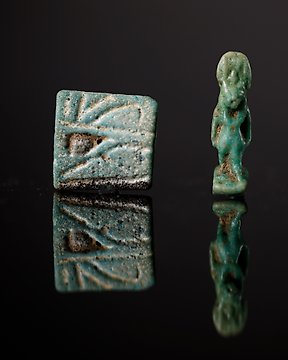
Altägyptisch Fayence Amulette der Göttin Bastet und Udjat - 2 cm
Nr. 82946785

Nr. 82946785

Udjat Amulet.
Ancient Egypt, Late Period, 664 - 332 BC
Faience.
2.6 cm length.
Condition: Good condition.
Provenance: Private collection, Somerset, United Kingdom. 1970.
Description:
The eye of Horus is an ancient Egyptian symbol of protection, royal power, and good health. The Eye of Horus is similar to the Eye of Ra, which belongs to a different god, Ra, but represents many of the same concepts.
Funerary amulets were often made in the shape of the Eye of Horus. The symbol "was intended to protect the pharaoh [here] in the afterlife" and to ward off evil. Ancient Egyptian and Middle-Eastern sailors would frequently paint the symbol on the bows of their vessels to ensure safe sea travel.
Amulets in Ancient Egypt were both decorative and practical, as they were considered as having apotropaic powers to protect or bestow power upon the wearer. Not only worn by the living, amulets have been found inside the wrappings of mummies, as they were used to prepare the deceased for the afterlife.
Amulets held different meanings, depending on their type or form. Small amulets depicting gods and goddesses seem to have induced the protective powers of the deity. On the other hand, small representations of anatomical features or creatures suggest that the wearer required protection over a specific body part, or that he/she desired the skills of a particular animal. Amulets depicting animals were very common in the Old Kingdom Period, whilst representations of deities gained popularity in the Middle Kingdom.
Notes:
- The piece includes authenticity certificate.
- The piece includes Spanish Export License (Passport for European Union) - If the piece is destined outside the European Union a substitution of the export permit should be requested, can take between 1-2 weeks maximum.
- The seller guarantees that he acquired this piece according to all national and international laws related to the ownership of cultural property. Provenance statement seen by Catawiki.
So kaufen Sie auf Catawiki
1. Etwas Besonderes entdecken
2. Höchstgebot abgeben
3. Sichere Zahlung durchführen